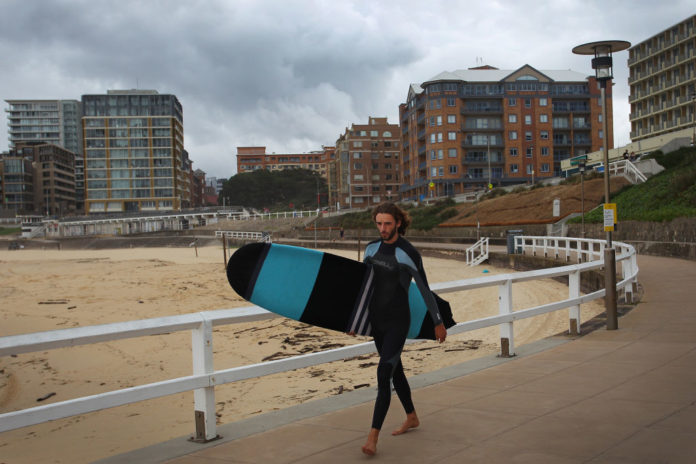Large swathes of coastal and regional NSW have been placed on COVID alert after high levels of the virus were detected in a number of sewage treatment plants.
NSW Health’s sewage surveillance program has detected fragments of the virus in sewage systems in Newcastle and on the central coast, mid north coast and central west, including Newcastle’s Burwood Beach, Shortland and Belmont on the central coast, Coffs Harbour and Bonny Hills on the mid north coast and Mudgee in the central west.
NSW Health says none of these areas have known cases of COVID-19 living in any of the areas they serve.
The Burwood Beach sewage treatment plant serves about 225,800 people from Newcastle City area and surrounding suburbs of Dudley, Charlestown, Jesmond, Lambton, New Lambton, Mayfield, Elermore Vale, Wallsend, Kotara, Garden Suburb, Adamstown Heights, Kahibah, Highfields, Merewether, Waratah West, Georgetown and Carrington. This is the first detection since April 2021.
The Belmont sewage treatment plant serves about 115,000 people from suburbs including Belmont, Warners Bay, Gateshead, Tingira Heights, Bennetts Green, Jewells, Redhead, Eleebana, Croudace Bay, Valentine, Marks Point, Blacksmiths, Pelican, Swansea, Swansea Heads, and Caves Beach.
The Shortland sewage treatment plant near Lake Macquarie serves about 60,000 people from Cameron Park, Fletcher, Maryland, Shortland, Mayfield West, Stockton, Sandgate, Callaghan, Kooragang, Fern Bay, Minmi, Birmingham Gardens and Fullerton Cove.
The Coffs Harbour sewage treatment plant serves about 57,400 people from the urban areas of Coffs Harbour, while Bonny Hills serves around 7,010 residents of Lake Cathie and Bonny Hills in the Port Macquarie-Hastings Local Government Area. It’s understood low levels of the virus were detected in the area’s sewage.
The Mudgee sewage treatment plant serves around 12,000 residents of the urban areas of Mudgee.
“NSW Health urges everyone in all of these areas to be particularly vigilant for the onset of symptoms that could signal COVID-19, and if they appear, to immediately be tested and isolate until a negative result is received,” it said in a statement.
NSW recorded 233 new locally acquired cases of COVID-19 in the 24 hours to 8pm last night. Of the new locally acquired cases, 103 are linked to a known case or cluster – 79 are household contacts and 24 are close contacts – and the source of infection for 130 cases is under investigation.
“Ninety-two cases were in isolation throughout their infectious period and 21 were in isolation for part of their infectious period. Forty-seven cases were infectious in the community, and the isolation status of 73 cases remains under investigation,” NSW Health said.
One new case was acquired overseas in the 24 hours to 8pm last night. Two previously reported cases have been excluded following further investigations, bringing the total number of cases in NSW since the beginning of the pandemic to 9,604.
Sadly, NSW Health has been notified of the deaths of two people who were confirmed COVID-19 cases. A woman in her 80s from Sydney’s inner west died at Royal Prince Alfred Hospital yesterday – she was the 16th COVID-related death during the current outbreak.
“A man in his 20s from south-west Sydney died at his home yesterday. He was a confirmed case of COVID-19 and was isolating at home. His death has been referred to the NSW Coroner,” NSW Health said.
“NSW Health expresses its sincere condolences to their families and friends.”
Of the 233 locally acquired cases reported to 8pm last night, 93 are from South Western Sydney Local Health District (LHD), 65 are from Western Sydney LHD, 54 are from Sydney LHD, nine are from South Eastern Sydney LHD, eight are from Nepean Blue Mountains LHD, two are from Northern Sydney LHD and two are from Illawarra Shoalhaven LHD.
NSW Health is currently investigating possible transmission of COVID-19 between returned travellers in Sydney’s CBD.
“Results of whole genome sequencing shows possible transmission between two separate groups of returned travellers staying on different floors of the Adina Town Hall in mid-July.”
“Two members of one family, who arrived at the hotel on 13 July, tested positive for COVID-19 on 15 July. They were transferred to Special Health Accommodation shortly after.
“One member of a second family staying on a separate floor of the Adina Town Hall tested positive to COVID-19 six days later. They had arrived on 9 July. That family was then also transferred to Special Health Accommodation.”
NSW Health’s routine genome sequencing now shows the infection of both families is an identical match.
“The virus is the Delta strain and different to the strain circulating in Sydney. No other cases in the Adina Town Hall have the same viral sequence,” it said.
“Currently, there is no evidence of further transmission.”


